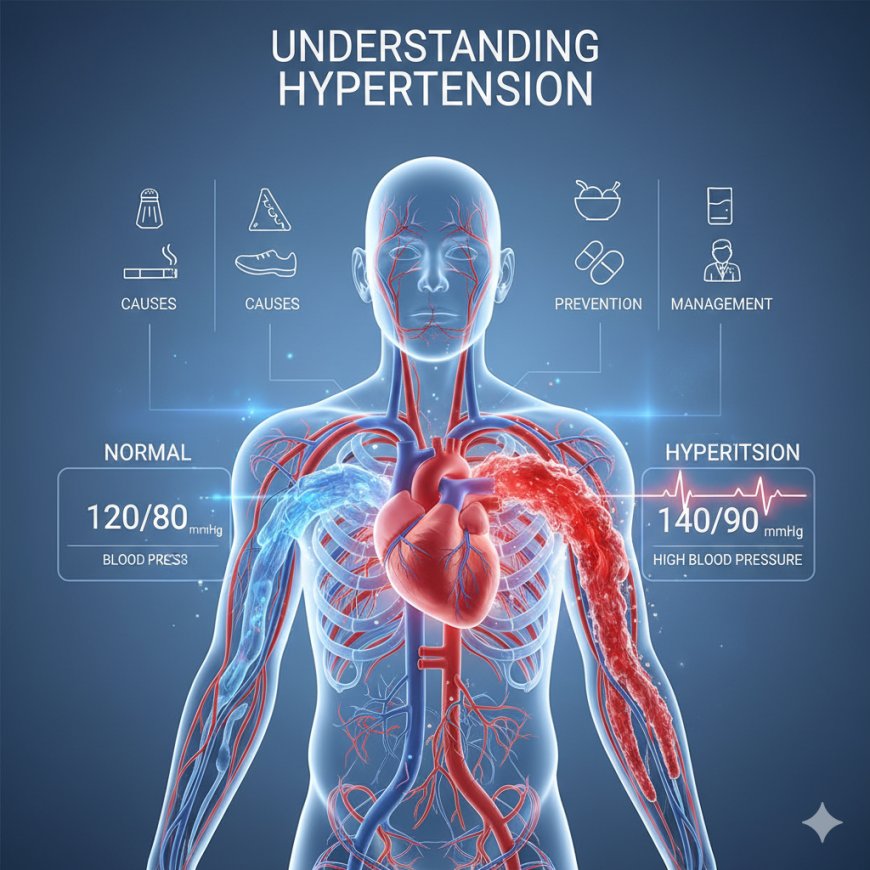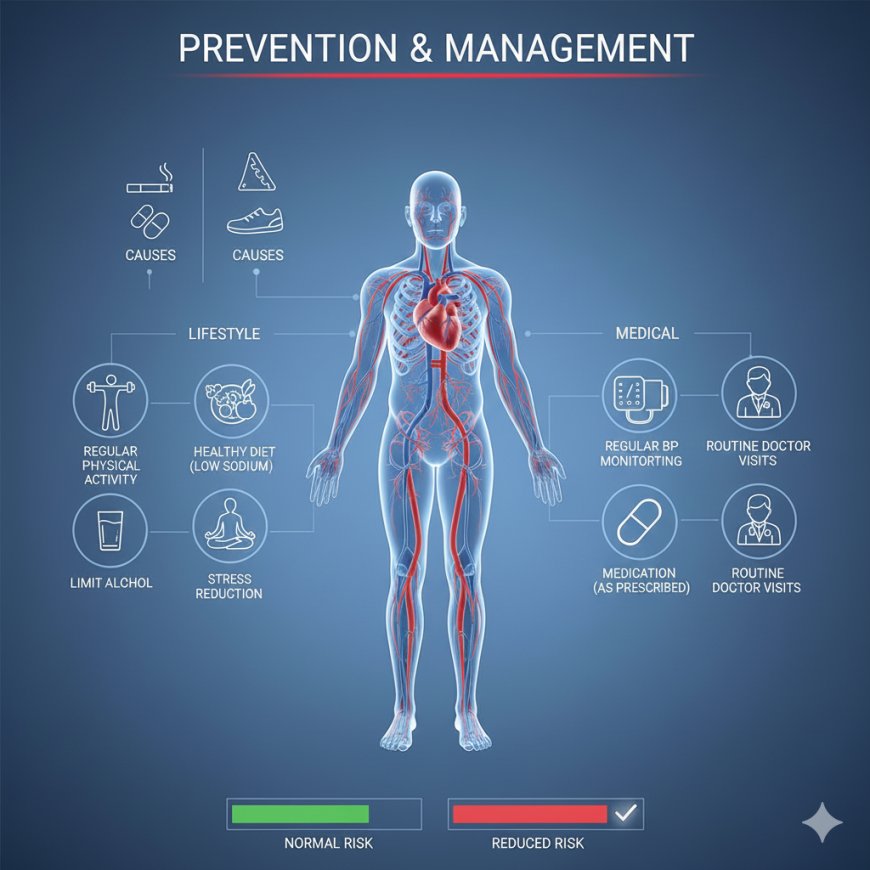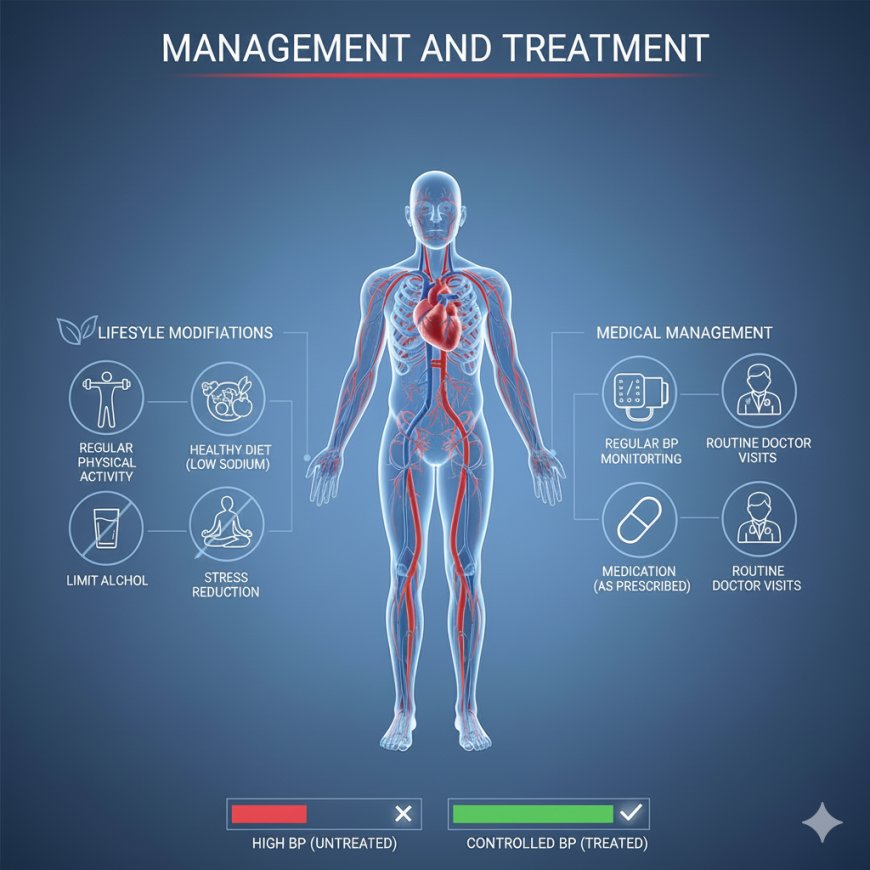Hypertension (High Blood Pressure) Causes, Prevention, and Management
Hypertension (High Blood Pressure) Causes, Prevention, and Management

Understanding Hypertension: Causes, Prevention, and Management
Hypertension, commonly known as high blood pressure, is a silent killer affecting millions worldwide. It's a condition where the force of blood against your artery walls is consistently too high, potentially leading to severe health problems like heart disease, stroke, and kidney failure. Understanding its causes, how to prevent it, and effective management strategies is crucial for a healthier life.
What is Hypertension?
Blood pressure is measured in millimeters of mercury (mmHg) and typically expressed as two numbers: systolic (the top number) and diastolic (the bottom number). Systolic pressure indicates the pressure when your heart beats, and diastolic pressure measures the pressure when your heart rests between beats. Normal blood pressure is usually below 120/80 mmHg. Hypertension is generally diagnosed when blood pressure consistently reads 130/80 mmHg or higher.
Factors such as stress, diet, genetics, and activity levels can all contribute to blood pressure fluctuations. While a single high reading isn't always cause for alarm, consistent elevated readings require attention.

The Causes of Hypertension
In most cases, hypertension develops gradually over many years without a clear identifiable cause, a condition known as primary or essential hypertension. However, several factors significantly increase your risk
-
Age: The risk of high blood pressure increases as you age.
-
Family History: If your parents or close relatives have high blood pressure, you're more likely to develop it.
-
Obesity: The more you weigh, the more blood you need to supply oxygen and nutrients to your tissues. As the volume of blood circulated increases, so does the pressure on your artery walls.
-
Lack of Physical Activity: Inactive people tend to have higher heart rates, forcing your heart to work harder with each contraction and increasing the force on your arteries.
-
High Sodium Intake: Too much sodium (salt) in your diet can cause your body to retain fluid, which increases blood pressure.
-
Low Potassium Intake: Potassium helps balance the amount of sodium in your cells. If you don't get enough potassium, you may accumulate too much sodium.
-
Excessive Alcohol Consumption: Heavy drinking can damage your heart over time.
-
Stress: High levels of stress can lead to a temporary increase in blood pressure. If you try to relax by eating more, using tobacco, or drinking alcohol, you may only exacerbate problems.
-
Chronic Conditions: Certain chronic conditions, such as kidney disease, diabetes, and sleep apnea, can also contribute to high blood pressure.
Prevention: Taking Control of Your Health
The good news is that hypertension is often preventable and manageable through lifestyle modifications.

-
Eat a Healthy Diet: Focus on a diet rich in fruits, vegetables, whole grains, and lean proteins. The DASH (Dietary Approaches to Stop Hypertension) diet is a proven eating plan for lowering blood pressure. Reduce your intake of saturated and trans fats, cholesterol, and added sugars.
-
Reduce Sodium Intake: Aim for less than 2,300 milligrams (mg) of sodium per day, and ideally less than 1,500 mg if you have high blood pressure or are at high risk. Read food labels carefully, as many processed foods are high in sodium.
-
Increase Potassium Intake: Foods rich in potassium include bananas, avocados, spinach, potatoes, and sweet potatoes.
-
Maintain a Healthy Weight: Losing even a small amount of weight can significantly impact your blood pressure.
-
Get Regular Physical Activity: Aim for at least 150 minutes of moderate-intensity aerobic activity or 75 minutes of vigorous-intensity activity per week. This can include brisk walking, jogging, swimming, or cycling.
-
Limit Alcohol Consumption: If you drink alcohol, do so in moderation. For healthy adults, that means up to one drink a day for women and up to two drinks a day for men.
-
Manage Stress: Find healthy ways to cope with stress, such as yoga, meditation, deep breathing exercises, spending time in nature, or engaging in hobbies.
-
Quit Smoking: Smoking significantly damages blood vessel walls and accelerates the hardening of arteries. Quitting is one of the best things you can do for your overall health.
-
Monitor Your Blood Pressure Regularly: Even if you feel healthy, regular check-ups with your doctor are essential to monitor your blood pressure and catch any issues early.
Management and Treatment
If you've been diagnosed with hypertension, your doctor will work with you to develop a management plan. This often involves a combination of lifestyle changes and medication.

Lifestyle Modifications:
As mentioned above, healthy lifestyle choices are the cornerstone of blood pressure management, even if you are taking medication.
Medications:
Several classes of medications are used to treat high blood pressure, including:
-
Diuretics: These help your body eliminate sodium and water, reducing blood volume.
-
ACE Inhibitors and Angiotensin Receptor Blockers (ARBs): These medications relax blood vessels by blocking the formation or action of a natural chemical that narrows blood vessels.
-
Beta-Blockers: These reduce the workload on your heart and open your blood vessels, causing your heart to beat slower and with less force.
-
Calcium Channel Blockers: These relax the muscles in your blood vessels and can slow your heart rate.
-
Renin Inhibitors: These drugs slow down the production of an enzyme that starts a process leading to constricted blood vessels.
Your doctor will determine the best medication or combination of medications for you based on your individual health profile and other conditions you may have.
Living with Hypertension
Managing hypertension is a lifelong commitment. Regular communication with your healthcare provider, consistent monitoring of your blood pressure (at home and during doctor visits), and adherence to your treatment plan are vital. By taking proactive steps, you can effectively control your blood pressure, reduce your risk of serious health complications, and enjoy a full, healthy life.







